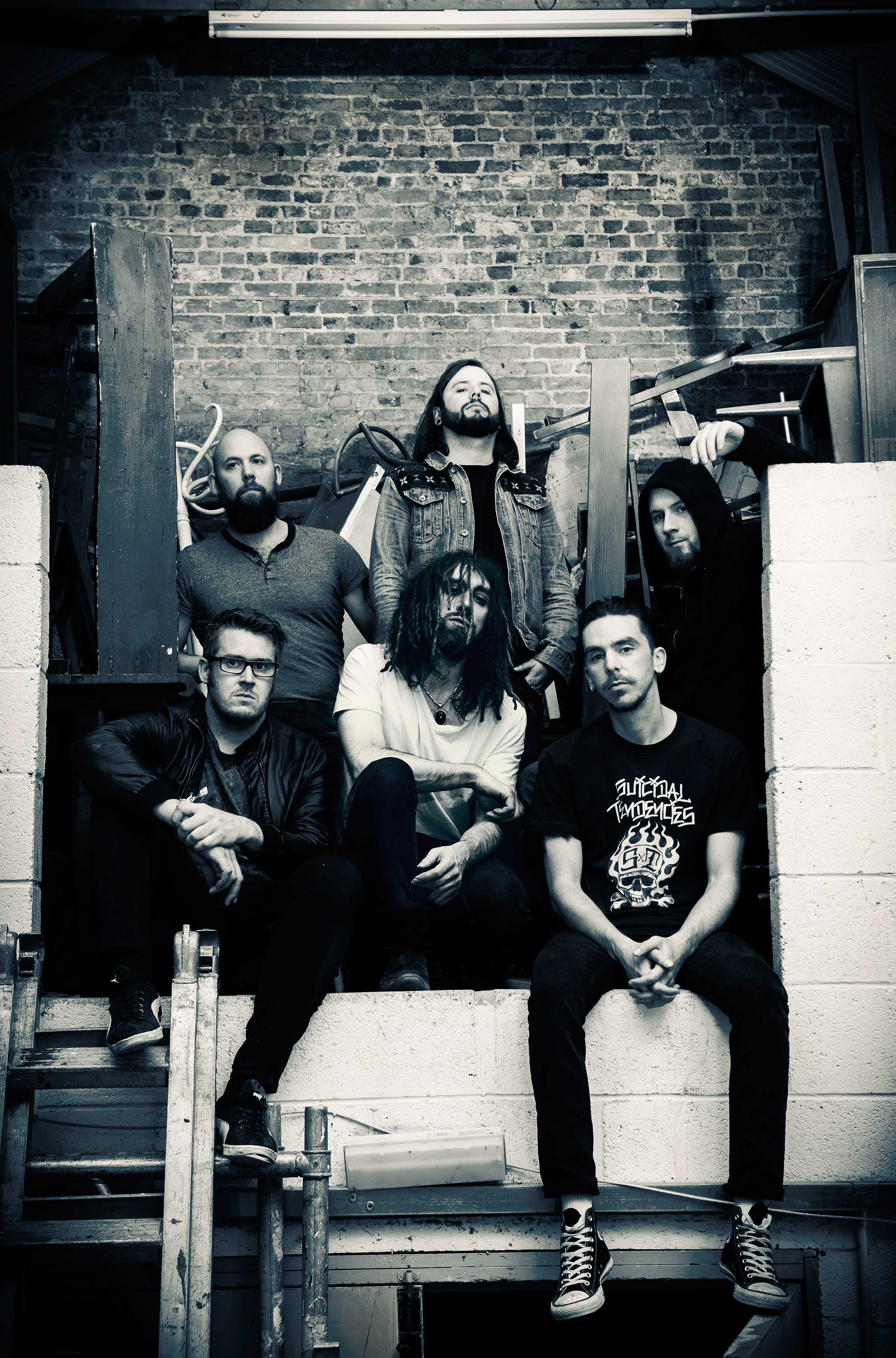As historical sites go, it may not be impressive as the cloisters of Oxford and Cambridge, but the true birthplace of 21st-century progressive metal is Watford. While both the metal and prog scenes were in a state of feverish flux, SikTh emerged from the Hertfordshire suburbs and gleefully set the rule book ablaze. Reluctant godfathers of the tech metal and djent scene that erupted soon after their untimely parting of the ways in 2007, they were embracing a wildly experimental mindset at a time when heavy music was largely descending into a state of homogenous mulch.
Much to the delight of their not insubstantial fan base, SikTh reformed in 2013 and are now back to reclaim their rightful place at the top of the British prog metal tree. As they release their first new material in nine years, guitarist Dan Weller, for perhaps the first time, suddenly finds himself analysing the genesis of SikTh, and how they changed progressive metal forever.
“There was a manifesto when we started, yeah,” he notes. “Looking back, it was spawned from the meeting of me and Pin [guitarist Graham Pinney] to start with. We went to school together. We were both self-taught and he was really into his shredding and I was really into Metallica and Pantera and riff writing. So we put our heads together and we’d write riffs that were quite unique for the time, I think.
Most prog music is very visual. It’s creating some kind of theatrical undertone, and we always wanted that
kind of depth.
“We were heavily into death metal and I remember this as clear as day: we didn’t understand why that kind of music always had to have that kind of imagery and those dark lyrics. We weren’t interested in that shit. We just wanted to make really extreme and heavy music without that kind of Satanic undertone. We weren’t just aiming for metal people’s ears and tried to push ourselves as far as we could.
“When we changed the line-up and Foord and James [Dan Foord, drums; James Leach, bass] came along, that’s when it became a more organic thing. They were both so good at their instruments and they had that drive to create something fresh and to leave a mark musically. So we put all our heads together and all our styles and it became this bizarre hybrid.”
SikTh’s sound remains difficult to pin down, despite its enduring influence on the British prog metal scene. An explosive blend of jarring, polyrhythmic riffs, eccentric, scattershot arrangements, bursts of ethereal melody and, significantly, the warped, evocative and intermittently mischievous combination of vocalists Mikee Goodman and Justin Hill, it somehow turned them from Watford pub venue regulars into the buzz band of the UK scene in the early noughties.
Spiritually linked to like-minded US peers like Dillinger Escape Plan and Between The Buried And Me while not sounding remotely like them, Weller and his technically proficient colleagues injected a sense of fun and chaos into metal, pre-empting the current explosion in progressive heaviness by a decade and winning themselves a handsome record deal in the process. Their debut album emerged in 2003, bearing the audaciously opulent title of The Trees Are Dead & Dried Out Wait For Something Wild. It boasted countless moments of bizarrely accessible intensity, extended spoken‑word passages from Goodman and more crackpot musical ideas than most bands of their generation could have conjured in a lifetime. As an advert for SikTh’s collective desire to move metal forward, it was both compelling and irresistibly odd.
“A lot of people who have been in the prog scene, one thing they share is an ambition to create something of their own by nature of being progressive,” says Weller. “Equally, though, it’s very cinematic. Most prog music is very visual. It’s creating some kind of theatrical undertone and we always wanted that kind of depth. A lot of that imagery is Mikee’s doing. He’s come up with a lot of great lyrics and imagery. When he suggested the first album title, we were like, ‘Are you taking the piss?’ but we went with it and we created something new and fresh along the way.”
Perhaps the most surprising thing about SikTh’s rise to glory was that it happened at all. Slotting neatly into a gap in the market that few people knew existed, they rocketed from the toilet circuit to an unassailable position as major players, selling out big venues and becoming the darlings of the ADHD internet generation that, to a great extent, was innocently shrugging off the idea that music should have any limits placed on it at all.
Bands this bizarre shouldn’t really become as popular or successful as SikTh became, and yet somehow they did. It’s something that fills the newly reconvened sextet with a sense of pride that they were too bewildered to truly experience first time round.
“If I’m being really honest, when you’re young and in a band, you’re so confident, bordering on arrogant, because you have to believe in what you’re doing,” Weller muses. “When you start getting fans and selling out venues, at that point you’re not surprised because you’ve never experienced failure. It’s all gone the way you want it to go, so you think, ‘This is fucking easy!’

“It didn’t shock us first time round, but it was a whirlwind of excitement. When you start getting record labels offering you a shit ton of money and you’re a mental metal band, you think, ‘Why are you giving us this money? Are you mad? [Laughs]”
The end of the first part of SikTh’s story follows a familiar pattern. Weller is keen to point out how utterly different all six members of the band are, both in terms of personalities and their own vision of how music should sound, and while pursuing a common goal worked for a few years, the intensity of being in SikTh during that first flush of success began to take its toll.
“We’re all so stubborn and there was a constant power struggle going on,” says the guitarist. “We used to say: ‘Faith No More all hated each other! It’s fine!’ [Laughs] We didn’t always get on, but we respected the music. As we’ve got older we’ve learned to understand and respect each other. You learn to compromise, but that comes from experience.”
Back in 2007, less than a year after the release of sublime second album Death Of A Dead Day, Sikth disintegrated. “Being happy in life had become a more important thing,” Weller recalls. “Up until the end of the second album, our lives had been defined by SikTh. We were all skint. We’d all had multiple relationships fail because of the band. It was the thing that mattered and nothing else did. Mikee wasn’t into it as much and he wanted to go in a different direction. When the team starts to fall apart, and you’re in your mid-20s and still living with your parents because you haven’t got any money, you wonder how long you can do it for. I’d started producing records and earning money – I was independent and doing my own thing. And the whole thing just seemed like it was heading for the bin, so we ended it before we ended up knocking out something half-arsed. We said we’d end it there, with a view to doing it again some day before we’re too old and start to suck. That was always the plan.”
In the years that followed their abrupt demise, SikTh have been consistently and noisily cited as an influence by countless bands, particularly from the djent scene that emerged from Milton Keynes via pre‑Tesseract game-changers Fellsilent. Suddenly Sikth were a cool name to drop (“…even though we’re about as uncool as it gets!” Weller laughs) and complex, exploratory and barking mad prog metal was gaining momentum as a subcultural force.
SikTh’s reunion for a high-profile slot at Download Festival in 2014 was an unexpected development, but one that was greeted with a huge wave of euphoria from the band’s long-standing fans and the countless new acolytes they had somehow accrued during their prolonged absence.
And now what could have easily been a brief reformation and a mere handful of gigs has turned into something far more substantial and, hopefully, enduring. The new Opacities EP nudges every aspect of SikTh’s sound up a few notches, retaining their goofy but other-worldly charisma and proving, for the second time, that there must be something in the Watford water that turned these boys into a thrillingly prescient and fearless musical phenomenon.
“After the first reunion shows we knew we had to write something, but if we wrote an album we’d probably end up killing each other!” Weller chuckles. “So it was a case of, ‘Let’s do something smaller and see how we get on.’ Then we buried our heads into it and got it done. We’re all massively proud of it.
“One thing that was really important to us was that people won’t put it on for the first time and say, ‘Oh… why did they do that?’ We understand the idea of giving people what they want. The music is more important than any of us. At the moment we’re in a good headspace and it’s all feeling really positive. We’re still the desperately uncool band that we were back then. We’re a bit older, but we’ve maintained the uncoolness, don’t worry!”
The Opacities EP is currently being crowdfunded on PledgeMusic: see www.pledgemusic.com/projects/sikth for details. For December’s tour dates, see www.facebook.com/sikthofficial.

